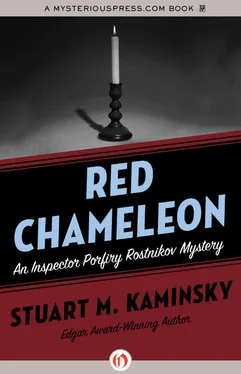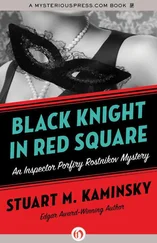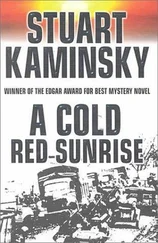Stuart Kaminsky - Red Chameleon
Здесь есть возможность читать онлайн «Stuart Kaminsky - Red Chameleon» весь текст электронной книги совершенно бесплатно (целиком полную версию без сокращений). В некоторых случаях можно слушать аудио, скачать через торрент в формате fb2 и присутствует краткое содержание. Год выпуска: 2012, ISBN: 2012, Издательство: MysteriousPress.com/Open Road, Жанр: Полицейский детектив, на английском языке. Описание произведения, (предисловие) а так же отзывы посетителей доступны на портале библиотеки ЛибКат.
- Название:Red Chameleon
- Автор:
- Издательство:MysteriousPress.com/Open Road
- Жанр:
- Год:2012
- ISBN:978-1-4532-6632-8
- Рейтинг книги:4 / 5. Голосов: 1
-
Избранное:Добавить в избранное
- Отзывы:
-
Ваша оценка:
- 80
- 1
- 2
- 3
- 4
- 5
Red Chameleon: краткое содержание, описание и аннотация
Предлагаем к чтению аннотацию, описание, краткое содержание или предисловие (зависит от того, что написал сам автор книги «Red Chameleon»). Если вы не нашли необходимую информацию о книге — напишите в комментариях, мы постараемся отыскать её.
Red Chameleon — читать онлайн бесплатно полную книгу (весь текст) целиком
Ниже представлен текст книги, разбитый по страницам. Система сохранения места последней прочитанной страницы, позволяет с удобством читать онлайн бесплатно книгу «Red Chameleon», без необходимости каждый раз заново искать на чём Вы остановились. Поставьте закладку, и сможете в любой момент перейти на страницу, на которой закончили чтение.
Интервал:
Закладка:
“That Mikhail had become a big gangster in America, just like the movies. Tiny Caesar, the Godfather. Guns. Everything. It was possible. Who knew? He was a hard boy, a hard young man. I was a clown.”
“Savitskaya?”
“Ah,” Ostrovsky said, moving close enough to whisper. “A macher.”
“A macher?”
“That’s Yiddish,” Ostrovsky confided. “A dead language for dead Jews like me. Savitskaya was a dealer, a man not to be trusted.”
“One more name,” Rostnikov said, standing up. “A fourth young friend of yours from the village. Shmuel Prensky. What became-”
Rostnikov had simply been finishing the routine, looking for another step, another lead. He had not anticipated the reaction. Lev Ostrovsky went an enamel white and trembled. The smile became a grimace of pain or fear.
“Dead,” Ostrovsky said, holding his mop handle, his knuckles twisted and white.
“When did he-”
“Long ago. He is dead, quite dead. Buried. Long ago.”
“Yuri Pashkov still lives in Yekteraslav,” Rostnikov pursued, walking over to the old man, ready to grab him if he should fall. “Pashkov-you remember him. He also seemed afraid of the name of Shmuel Prensky.”
“Afraid? Me?” Ostrovsky said with a false laugh. He was acting quite poorly now. His reviews, if he survived the terror he was going through, would not be approving. “Shmuel Prensky is dead. I’m a very old man in case you haven’t noticed. I have nothing to be afraid of from anyone on this earth. I’ve played the great roles. On this very stage I played Grigory Stepanovich Smirnov in Chekhov’s The Boor. And I’d still be acting if they let Jews have decent roles. See, I’m not afraid to tell a policeman such things. So how could you-”
Rostnikov closed his eyes and opened them with a little shrug. “Perhaps I was mistaken,” he said.
“Mistaken,” the old man said vehemently. He began to mop the floor without bothering to dip it into the water. Then a thought struck him, and he turned, trembling.
“Gorky himself,” he said, sweeping the darkness with his hand, “said the Art Theatre is as marvelous as the Tretyakov Gallery, St. Basil’s Cathedral, and all the finest sights of Moscow. It is impossible not to love it.”
“I can see that,” Rostnikov said, watching the man justify himself to himself.
“It’s enough to simply be in here, to be on this stage, to play out a little scene between soaping. To live out my last days with no trouble.”
“I understand,” Rostnikov said.
“‘Life,’” said the old man almost to himself, “‘has gone by as if I had never lived. I’ll lie down a while. There’s no strength left in you, old fellow; nothing is left, nothing. You addle head.’”
“Firs’s final speech in The Cherry Orchard,” Rostnikov said. “A fine performance.”
“Thank you,” Ostrovsky said, some of his spirit and color returning. “But-”
The old man was looking over Rostnikov’s shoulder behind the stage, and Rostnikov turned to watch his uniformed driver hurry toward him. The man or the uniform had brought the fear back into Ostrovsky’s eyes.
“Comrade inspector,” the young man with the flat face said, ignoring the setting and the ancient actor. “You have a message, an urgent message from Investigator Zelach.”
“Coming,” Rostnikov answered, and then to the old man, he said, “Perhaps we will discuss ancient history and the life of the theater at some point in the future.”
“My pleasure,” said Ostrovsky, his smile broadening, his manner making it clear that such an encounter would not be a pleasure at all.
Rostnikov followed the driver toward the wings. He couldn’t keep up with the younger man, not with his bad leg. Instead, he relied on that which he always relied on, his steady movement. He would bear in mind Gorky’s detective from Kostroma; he would endeavor to move with caution and not get himself killed by runaway horses.
Behind Rostnikov, Lev Ostrovsky waited, waited a full five minutes, waited cautiously in case it was some trick and the policeman was hiding in the darkness. He forced himself to finish the floor, to make straight lines of soapy water, to set up the record player again, to listen to the martial music from Rocky, to control himself, to act out the role of cleaning man, a role he wanted to continue for whatever days he might have left. He waited a full five minutes, and then, when he was confident that he was again alone, he put down his mop, turned off the record player, and hurried off to find a telephone.
“Old, it’s an old rifle. What can I say?”
Karpo watched Paulinin searching through the drawer of his desk in the laboratory on the second level below ground of Petrovka. Paulinin was wearing a blue smock and looked more like a flower seller in Dzerzhinsky Park than the eclectic encyclopedia he was. Paulinin looked rather like a bespectacled, nearsighted monkey with an oversized head topped by wild gray-black hair. He was forever searching for something, putting things together, looking for challenges. His office was a clutter-piles of books, objects from past investigations. Here a pistol with the barrel missing. There, on the tottering pile of books on the edge of the desk, some false teeth.
“You can,” said Karpo, standing in front of the desk, motionless, “tell me when it was made, who made it, how I might discover who it belongs to.”
“Miracles,” said the monkey of a man, pulling a long wire from the drawer, examining it carefully with a squint and returning it. “The man wants miracles.”
And miracles, Karpo knew, were just what Paulinin liked to deliver. And so he waited patiently, immobile, a dark tower around which buzzed the clever spider monkey.
Paulinin pushed the drawer closed, tapped both open palms on the paper-covered desk, and considered. An idea struck, and he shoved a report on coarse yellow paper aside and grabbed a syringe as if it might try to scurry off the table.
“An 1891-30 Moisin, our primary rifle of the last war with the Germans,” Paulinin said, holding the syringe up to examine it against the ceiling light. “There are thousands still around. Amazing that this one can still shoot. The bullet went through an almost smooth barrel. The whole rifle is a relic. I don’t see how anyone could hit the Kremlin-forgive my example-with it, let alone a policeman fourteen stories below.”
Paulinin turned his back to place the examined syringe on the small sink in the corner.
“Go on.”
Karpo’s arm had in the past several days begun to lose all feeling. It had to be placed by him in the black sling like a sleeping baby each morning. He wondered if the numbness would continue to spread up his shoulder to the rest of his body. There was no fear in his conjecture, only a curiosity and a suppressed regret deep within.
“So,” Paulinin said, turning to face Karpo and folding his arms as he leaned back against the sink, “the gun does not break down. It does not come apart, to be placed in a little carrying case. This is no-what was that American movie?”
Karpo did not go to movies, had only seen part of one while pursuing a pickpocket in the Rossia Theater five years earlier.
“Filthy Harry,” Paulinin said. “That was it. Americans are rifle crazy since Kennedy. Movies, books, full of rifles, full of people shooting people from rooftops. Like your Weeper.”
“The rifle could not be broken down for transport,” Emil Karpo reminded Paulinin, who pushed away from the sink and began to search through the pile of books on the desk.
“Your Weeper has to carry the rifle around full length. It is 51.5 inches long and weighs 8.8 pounds without bayonet. It’s not some little thing, either. Big, long, a Cossack penis, we used to call them. So, ask yourself, Comrade Karpo, how did your Weeper carry that rifle up to those roofs and down? What did your killer carry in it? A rolled-up rug, what? It’s too big for a violin case like they used in old American movies.”
Читать дальшеИнтервал:
Закладка:
Похожие книги на «Red Chameleon»
Представляем Вашему вниманию похожие книги на «Red Chameleon» списком для выбора. Мы отобрали схожую по названию и смыслу литературу в надежде предоставить читателям больше вариантов отыскать новые, интересные, ещё непрочитанные произведения.
Обсуждение, отзывы о книге «Red Chameleon» и просто собственные мнения читателей. Оставьте ваши комментарии, напишите, что Вы думаете о произведении, его смысле или главных героях. Укажите что конкретно понравилось, а что нет, и почему Вы так считаете.












